What is Gingivitis Treatment?
A common type of gum disease like gum bleeding called gingivitis causes the gums to swell and become inflamed. It can develop into periodontitis, a more severe ailment, if neglected.
Treatment for gingivitis often includes altering one’s lifestyle as well as oral hygiene, mouthwash use, professional cleanings, and antimicrobial mouthwash.
Brushing your teeth with fluoride toothpaste at least twice a day and flossing once a day to remove plaque and food particles from between your teeth are two steps you can take to improve your oral hygiene. The germs that cause gingivitis can be killed by using an antibacterial mouthwash.
Procedure Time
1.5 - 2.5 Hours
Downtime
24 - 48 Hours
Back to Work
2 - 3 Days
Results
10 - 14 Days
What causes Gingivitis Disease?
Plaque accumulation along the gum line and on the teeth leads to gingivitis. When the sugars and carbohydrates in food interact with the bacteria in your mouth, plaque, a sticky film of germs, accumulates on your teeth. Gingivitis can develop when plaque is not eliminated by brushing and flossing because it can irritate and inflame the gums.
Additional variables that can contribute to the development of gingivitis include:
- Inadequate oral care: If you don’t brush and floss regularly, plaque can build up and cause gingivitis.
- Hormone changes: Pregnancy, puberty, and menopause can all cause hormonal changes that increase the risk of gingivitis in the gums.
- Smoking and tobacco use: Use of tobacco products, such as smoking, can make gingivitis more likely to develop and more difficult to treat.
- Diabetes: Gum disease, particularly gingivitis, is more common in those with diabetes.
- Medications: Certain pharmaceuticals, like anti-seizure meds, blood pressure pills, and immunosuppressive therapies, can raise the risk of gingivitis.
- Genetics: Genetic factors may make certain persons more prone to acquiring gum disease.
To prevent and treat gingivitis, it’s crucial to practice proper oral hygiene and visit your dentist frequently.
Before and After Gingivitis Treatment
You can see the clear difference between before and after the gingivitis treatment. Book your consultation now at Enfield Royal Saudia to know more about it.

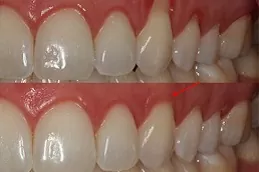
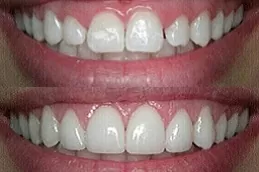
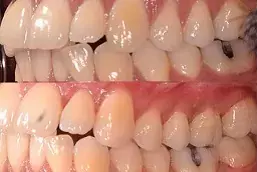
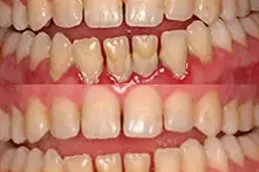
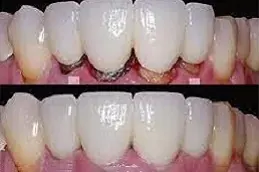
Does Gingivitis go away?
Absolutely, gingivitis is treatable with the right care and good oral hygiene practices. A form of gum disease known as gingivitis causes the gums to swell and become inflamed. Plaque accumulation on the gum line and teeth is the root of the problem. Periodontitis, a more severe form of gum disease that can permanently harm the gums and teeth, can develop from gingivitis if it is not treated.
The good news is that gingivitis is treatable and reversible with the right care, which includes enhancing dental hygiene, using an antibacterial mouthwash, getting a professional cleaning, and changing one’s lifestyle by giving up smoking and adopting a nutritious diet.
Within a few days to a few weeks, with continuous and effective therapy, the condition of the gums may improve. To keep gums healthy and stop the issue from recurring, it’s crucial to keep up with proper oral hygiene practices and routine dental exams.
How long does it take to get rid of Gingivitis?
Depending on the severity of the problem and the patient’s response to treatment, gingivitis can take a variety of times to clear up. Within a few days to a few weeks, with good and persistent therapy, the condition of the gums may improve.
Gingivitis treatment includes improving dental hygiene. To remove plaque and food particles, it’s imperative to brush twice daily and floss everyday. Using an antimicrobial mouthwash can also help destroy bacteria that cause gingivitis.
Gingivitis can also be effectively treated with professional cleaning performed by a dentist or dental hygienist. Plaque and tartar buildup that cannot be eliminated by brushing and flossing alone can be removed by them.
Adopting lifestyle adjustments like giving up smoking, eating a nutritious diet, and controlling stress can also aid in the treatment of gingivitis.
Gingivitis may typically be treated well and cured within a few weeks to months. To keep gums healthy and stop the issue from recurring, it’s crucial to keep up with proper oral hygiene practices and routine dental exams.
How long does Gingivitis last without treatment?
Depending on the severity of the problem and the patient’s dental health, gingivitis can last for a variety of lengths of time without treatment. Plaque accumulation along the gum line and on the teeth can result in gingivitis, which can irritate and inflame the gums.
Periodontitis, a more severe form of gum disease that can permanently harm the gums and teeth, can develop from gingivitis if it is not treated. Periodontitis can develop from gingivitis at different rates, and some people may be more prone to acquiring more severe kinds of gum disease.
Gingivitis can persist for several months or even years without therapy. The more harm it can do to the gums and teeth the longer it is left untreated. To avoid gingivitis developing into a more serious type of gum disease and to maintain good oral health, it is crucial to get treatment as soon as possible. Gingivitis can be prevented and treated with the use of routine dental exams and proper oral hygiene practices.
What are the natural ways to cure Gingivitis?
There are certain natural therapies that can assist improve gum health and support the healing process even though good oral hygiene practices and expert dental care are the most efficient approaches to treat gingivitis. Here are a few illustrations:
- Oil pulling: Oil pulling can help lower the quantity of dangerous bacteria in your mouth and enhance the health of your gums by swishing coconut oil or sesame oil around in your mouth for 15 to 20 minutes.
- Saltwater rinse: Gargling with a saltwater solution might help to ease sore gums and reduce swelling.
- Turmeric: Due to its anti-inflammatory and antibacterial properties, turmeric can help fight gum infection and reduce gum inflammation. Gum health may be enhanced by including turmeric in your diet or using it as a mouthwash.
- Aloe vera: Due to its anti-inflammatory and antibacterial qualities, aloe vera can assist to lessen gum inflammation and encourage healing.
While there may be some alleviation and support from natural treatments for gingivitis, these treatments should not be utilized in place of professional dental care and oral hygiene practices.
How to reverse Gingivitis?
With the right care and attention, gingivitis, a kind of reversible gum disease, can be effectively treated and reversed. The following actions can assist in treating gingivitis:
- Brush your teeth twice a day for two minutes each time. Gingivitis can be prevented by eliminating plaque and bacteria from your teeth twice daily. Employ fluoride toothpaste and a soft-bristled toothbrush.
- Daily flossing is essential for getting rid of plaque and food particles that a toothbrush can’t reach between teeth and along the gum line.
- Use an antibacterial mouthwash to freshen your breath and help destroy the bacteria that cause gingivitis. A mouthwash with antibacterial components, like chlorhexidine, is what you should pick.
- Plaque and tartar accumulation that cannot be removed by brushing and flossing alone can be removed by a dental hygienist. A professional cleaning should be scheduled at least twice a year, or as your dentist may advise.
- Smoking can worsen gingivitis and raise the likelihood that periodontitis will develop. Giving up smoking can enhance gum health and lower the risk of developing gum disease.
- Stress can impair your immune system and hinder your body’s ability to fight against infections. Gum health can be enhanced by engaging in stress-reduction practices like yoga, meditation, or deep breathing.
Within a few days to a few weeks, with continuous and effective therapy, the condition of the gums may improve. However, it is important to continue with good oral hygiene habits and regular dental checkups to maintain healthy gums and prevent the condition from returning.
How do dentists fix gum disease?
Depending on the severity of the condition, dentists and dental hygienists have a variety of ways to treat gum disease, also known as periodontal disease. Some common treatments for gum disease include:
- Scaling and root planning: In a deep cleaning process called scaling and root planning, plaque and tartar are removed from the tooth and root surfaces. It may be done under local anesthetic to help lessen discomfort.
- Antibiotics: Antibiotics may occasionally be prescribed to treat bacterial infections brought on by gum disease.
- Laser therapy: This is a non-surgical procedure that uses a dental laser to remove infected tissue and promote healing.
- Surgery: In more advanced cases of gum disease, surgical treatment may be necessary to repair or regenerate damaged gum tissue.
- Periodontal maintenance: After treatment, regular follow-up appointments are important to maintain gum health and prevent further damage.
Dentists and dental hygienists may also provide guidance on proper brushing and flossing techniques, as well as lifestyle changes (such as quitting smoking) to help prevent and manage gum disease. The specific treatment approach will depend on the individual’s needs and the severity of their gum disease.
Floss Action vs Advanced Clean
Plaque and bacteria that might lead to gingivitis can be removed with both floss activity and modern, clean toothbrushes. The decision between the two, however, is based on personal preferences and requirements.
The bristles of floss action toothbrushes are made to replicate the motion of flossing, making them the perfect alternative for those who find it difficult to floss. These toothbrushes are efficient at removing plaque and other debris from the gum line and in between the teeth, which can aid in the prevention of gingivitis.
On the other hand, advanced clean toothbrushes include bristles that are intended to remove more plaque and bacteria than regular toothbrushes. These toothbrushes often include several brush heads and advanced features including pressure sensors, timers, and different brushing modes. These may be especially useful for those who desire a more thorough cleaning or who have trouble getting to certain areas of the mouth.
Finally, gingivitis can be treated and prevented with the use of both flossing and modern, clean toothbrushes. The most important thing is to select a toothbrush that you enjoy using and that suits your particular requirements and tastes. In order to maintain healthy gums, it’s also crucial to practice proper oral hygiene practices like brushing and flossing twice daily and visiting the dentist on a regular basis.
How long does a Gingivitis cleaning take?
Depending on the degree of gingivitis and the amount of plaque and tartar buildup on the teeth, the time required for a gingivitis cleaning, often referred to as a dental prophylaxis or a routine cleaning, can change. A dental prophylaxis typically lasts between 30 and an hour.
A dental hygienist will use specialized tools to remove plaque and tartar from the teeth and gum line during the cleaning. They will also polish the teeth to eliminate surface stains and smooth the tooth surfaces, which can assist prevent further plaque formation.
Sometimes, if the gingivitis is more severe, the dental hygienist may advise scaling and root planing, a more thorough cleaning. In order to encourage gum tissue reattachment, this procedure entails cleaning plaque and tartar from the teeth as well as from the roots of the teeth that are below the gum line. This process can require many appointments and take longer—typically one to two hours.
It’s crucial to remember that maintaining basic oral hygiene practices like brushing and flossing twice a day and scheduling frequent cleanings and checkups with your dentist is the greatest approach to avoid the need for major cleanings. This can aid in the early detection of gingivitis and stop it from developing into more serious gum disease.
What is the cost of Gingivitis Treatment in Riyadh?
The severity of the condition, the kind of treatment required and the number of sessions it requires.
Costs can range from SAR 100 to SAR 500 for a standard dental prophylaxis, which is a professional teeth cleaning procedure advised every six months. If scaling and root planning is needed for more advanced cases of gingivitis, the cost can range from SAR 500 to SAR 1,500 per quadrant (one-fourth of the mouth) (one-fourth of the mouth).
Gingivitis Treatment
Starting FromGingivitis Treatment
StandardWhy choose Us?
It is very important to go for the right dentist and dental hygienist in order to get yourself the best treatment. At Enfield Royal Saudi, you will find the best dentists who provide best service and satisfy their patients with their work.
Best Dentist in Riyadh
At Enfield Royal Saudia, you will find the best dentists and dental hygienists . It is important for us to provide our patients full satisfaction, therefore, we have the best dentists who are highly qualified and experienced. Our customer service is the best in town and we make sure to cooperate with our patients in every possible way.
Cheap Dental Clinic in Riyadh
Enfield Royal Saudia is not only the best, but also the cheap dental clinic in Riyadh. As compared to other clinics. Our prices are flexible and pocket friendly, so you can get your treatment on a budget.
We assure you will have the best experience.
To find out more, fill the consultation form to book yourself a free consultation from the best dentist in Riyadh.
FAQs.
Yes, prophylaxis is another term for dental cleaning. A dental hygienist will use prophylaxis to professionally clean the teeth and gums by removing plaque, tartar, and other debris. It is advised to have this procedure done every six months to maintain good oral health and avoid dental issues like gingivitis and tooth decay. It is typically done as part of a routine dental checkup.
In addition to applying fluoride to the teeth to help prevent cavities during prophylaxis, the dental hygienist may also offer advice on how to properly brush and floss in order to maintain good oral hygiene practices. The procedure is typically painless and takes around 30 minutes to an hour to complete.
Salt water rinses are a beneficial addition to the treatment of gingivitis because they can lessen swelling and encourage gum healing. The salt in the rinse can lessen gum swelling and bleeding while also assisting in the neutralization of oral bacteria.
To use a salt water rinse for gingivitis, just put a teaspoon of salt in a cup of warm water and swish the solution around in your mouth for 30 seconds before spitting it out. Continue this method two to three times a day or as directed by your dentist or dental hygienist.
Look for toothpaste that contains active ingredients such as triclosan, fluoride, and stannous fluoride, which can help reduce plaque and bacteria in the mouth, as well as control gum inflammation. It’s also important to look for toothpaste that is gentle on the gums, as harsh abrasives or detergents can further irritate inflamed gums. Look for toothpaste that has been clinically tested and approved by dental professionals for use in managing gingivitis.
Some examples of toothpaste that are recommended for gingivitis include Crest Gum Detoxify, Colgate Total Gum Health, and Parodontax. It’s always a good idea to consult with your dentist or dental hygienist for specific recommendations on toothpaste for your individual needs.
Relevant Treatments.

Gum Bleeding
Gum bleeding is an indication of gingivitis or gum inflammation is bleeding gums. This common and mild form of gum disease is brought on by a buildup of plaque along the gum line. If you...
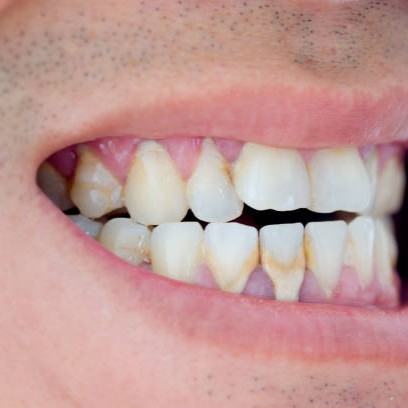
Dental Tooth Calculus
Dental calculus is a hardened deposit that builds up on the teeth and gums and is hard and penetrating. Plaque develops tartar within 24 to 72 hours if it is not regularly removed...
Relevant Posts.

Cost of Gingivitis Treatment in Riyadh
Ready to embark on the pathway to a healthier smile? Explore the Cost of Gingivitis Treatment in Riyadh which is not just about numbers. It is all about investing your money to get worthy and useful wellness. Let us together step into the domain of oral care expenditure, where your smile becomes worthy. Join us to discover the therapy for your dental problems at a lower cost. Read the below information. Gingivitis Treatments include routine dental cleanings and enhanced dental hygiene. Immediate therapy usually inverts signs of gingivitis and controls it from directing to more severe gum disorder and tooth failure.





